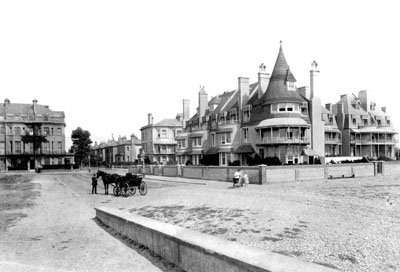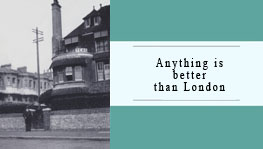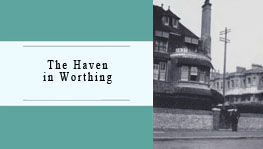
A view of The Esplanade from the south-west in 1890. The Haven, where Oscar Wilde
stayed, is the house at the left-hand end of the terrace. © The Francis Frith Collection
Chapter 2: 'Anything is better than London' – The Haven in Worthing
The second chapter begins with an explanation of how it was that the Wildes came to be spending part of the summer of 1894 in Worthing. This is followed by an account of Constance’s arrival at the Haven with the children three days before her husband.
It is demonstrated that the date of Wilde’s arrival in Worthing was 10 August and not 1 August, as suggested by an answer Wilde appears to have given during the Queensberry libel trial. Either he misremembered the date or it was incorrectly transcribed.
A detailed account is given of the members of the household at the Haven in the summer of 1894, including a ‘horrid ugly Swiss governess’, who seems to have left the household by the end of August. There is particular focus on Arthur Fenn, Wilde’s ginger-haired teenage valet, whose role in the Wilde story has not previously received any attention.
The chapter ends with an account of the seaside activities of the summer holiday, including reference to Wilde’s proficiency both as a swimmer and as a builder of ‘long rambling’ sandcastles for his children, ‘with moats and tunnels and towers and battlements’.
The extract that follows (with the end-noting numbers removed) is the opening section of the chapter.
The Wildes’ decision to spend their summer holiday in Worthing seems to have been sudden. On 30 July 1894, only eight days before she was to set off for Sussex, Constance Wilde wrote to her friend Georgina Mount Temple:[1] ‘We are very likely going to take the boys to Worthing for a month if we can get a house there.’ Within five days the arrangements were in place, and Constance was writing to Georgina: ‘… on Tuesday [7 August] we go off to Worthing for 4 or 5 weeks.’
The house she had found was called the Haven. It was a four-storey end-of-terrace house, part of a development of four terraced and four semi-detached houses called the Esplanade, just off the seafront on the edge of the town. In 1894 these were the final buildings at the eastern end of Worthing.
There is nothing surprising about the choice of Worthing for the Wildes’ holiday. A resort within reasonably easy reach of London was desirable, and indeed Wilde and Constance each made one or two day-trips to the capital during August and September. Wilde was familiar with Brighton, and had stayed there a number of times, but the smaller and quieter resort ten miles or so to the west would have been better for young children. Although there had been a serious typhoid epidemic in Worthing the previous year, extensive measures had been put in place to prevent a recurrence, so only the timorous would have stayed away in 1894.
Worthing would also have been cheaper than Brighton, and the unhappy state of Wilde’s finances is a recurring theme in his letters that summer. Only a few weeks before the Worthing holiday Wilde had had to decline an invitation to accompany some friends to Paris, explaining to Bosie: ‘I have no money, as usual, and can’t go.’[2] At about the same time Wilde sent the actor-manager George Alexander a brief outline of the play that was to become The Importance of Being Earnest asking him for £150 [about £15,000 in today’s money] in return for first refusal, and rather optimistically assuring Alexander that he would return the money if the play was not in the end suitable. ‘I am so pressed for money, that I don’t know what to do,’ he said. He admitted that his own extravagance was partly to blame, but added that he had to pay for his mother’s household as well as his own.[3] Alexander did in due course oblige.
In a letter Wilde wrote to Bosie the day before he went down to Worthing, Wilde returns to the question of his financial difficulties:
I am overdrawn £41 [about £4,100 today] at the bank: it really is intolerable the want of money. I have not a penny. I can’t stand it any longer, but don’t know what to do … Ernesto has written to me begging for money – a very nice letter – but I really have nothing just now.[4]
It was vital that Wilde quickly earn some money. An Ideal Husband was finished and was scheduled for production, but – while the likely proceeds from one play would be a help –Wilde’s desperate financial situation meant that he felt he needed the earnings from two.
Giving the children a holiday and finding somewhere relatively quiet to concentrate on writing a new play were not, however, the only reasons for leaving the capital. In his letter to Bosie Wilde commented that ‘anything’ was better than London, followed by a brief paragraph explaining why:
Your father is on the rampage again – been to Café Royal to enquire for us, with threats etc. I think now it would have been better for me to have had him bound over to keep the peace, but what a scandal! Still, it is intolerable to be dogged by a maniac.[5]
Worthing would, among other things, provide temporary respite from Queensberry, since even he would hesitate to intrude upon a family holiday.
The aptly-named Haven was owned by a woman called Miss Lord. During the Queensberry libel trial Wilde said that the house was rented from ‘a friend of my wife’s’. It has been suggested that this was an acquaintance of the Wildes called Henrietta Lord, an early translator of Ibsen’s plays,[6] but there is no evidence for this. Indeed Constance’s letter of 30 July makes clear that she was actively seeking out accommodation in Worthing, with no suggestion that it might be provided by a friend. In addition Constance learnt the reason for Miss Lord’s having vacated the Haven only when she arrived at the house and heard ‘bad accounts of Miss Lord’s health’ from one of the servants there: ‘She seems to be at Matlock crippled with rheumatic gout.’ If Miss Lord had been a friend, Constance would surely have already known of this.
Although the typhoid epidemic had devastated Worthing’s holiday trade the previous summer, the town was, according to the Worthing Gazette of 8 August, doing excellent business in 1894:
Evidences of restored confidence in the absolutely secure sanitary condition of the town have been accumulating during the past few weeks, until we have arrived at a time when the visiting public are with us in numbers fully equal to those of the corresponding period in any past year.
The paper reported that on 6 August – Bank Holiday Monday, which at that time was at the start of the month – a record 3,526 people passed through the pier turnstiles. The previous year, during the typhoid epidemic, the number had been 924. On 7 August the Chairman of the Sanitary Committee told the Town Council that the death-rate for the past three months had been ‘of an even more satisfactory character’ than that for the previous quarter. The exact figure – which had not been available to the Sanitary Committee’s Chairman, but was obtained by the Gazette – was 8.6 per thousand, ‘being splendid testimony to the extreme healthiness of the borough’. Importantly, there had been ‘no death from any notifiable disease’, such as typhoid.
Constance arrived at the Haven on Tuesday 7 August. The main reason that she preceded Oscar to Worthing was probably to ensure that the household was running smoothly by the time he arrived. Organising a new household was, however, a task that she herself dreaded, as she made clear to Georgina Mount Temple on 4 August, three days before she left for Worthing:
I have today signed the agreement with Miss Lord [in the Wilde household, this was evidently woman’s work], and as I have to take down linen, plate, & cutlery you can imagine how busy I am, and busy with the things that I most detest [underlined twice]. I wish that things would settle themselves in some sort of convenient way. I shall have to keep house for 5 weeks with strange servants, and my heart sinks at the prospect!
Once she arrived in Worthing, Constance’s anxieties seem largely to have subsided, for she immediately reports to Georgina Mount Temple: ‘I like Miss Lord’s dear little house and Miss Walker has made us most comfortable.’ (Miss Walker was presumably one of Miss Lord’s servants.) The weather, however, was ‘terribly windy’.
The wind continued for several days. The Watermen’s Regatta, scheduled for Wednesday 8 August, had to be postponed by a day, and the conditions were still far from ideal, as the Worthing Gazette reported:
Even on Thursday the atmospheric conditions, though sufficiently favourable to enable the programme to be carried out, were far from satisfying the conditions which such an occasion demands. It was bright and clear overhead, but a powerful westerly wind was blowing, and while the sailing boats in speeding over the course were materially assisted in their progress, the oarsmen found their task a very laborious one … Owing to the difficulties encountered, the labour of getting through the programme was a most formidable one, and the patience of the onlookers was sorely taxed by the slowness of the proceedings.[7]
Wilde arrived in Worthing a few days later. During the Queensberry libel trial, he was asked by Sir Edward Clarke ‘When was it you went down to Worthing?’, and, according to the court transcript, replied: ‘I think the 1st of August I went there.’[8] However this date is over a week adrift, contradicted as it is by irrefutable evidence in Constance’s letters.
As we have seen, on 4 August Constance had written to tell Georgina Mount Temple that she and the boys were going to Worthing in three days’ time. On 7 August she duly wrote from the Haven: ‘Here am I settled with my two dear boys and Oscar comes, I believe, on Friday [10 August].’ In view of Constance’s ‘I believe’, we cannot be certain that Oscar arrived on the projected day, but it is reasona Wilde arrived in Worthing a few days later. During the Queensberry libel trial, he was asked by Sir Edward Clarke ‘When was it you went down to Worthing?’, and, according to the court transcript, replied: ‘I think the 1st of August I went there.’[8] However this date is over a week adrift, contradicted as it is by irrefutable evidence in Constance’s letters.
As we have seen, on 4 August Constance had written to tell Georgina Mount Temple that she and the boys were going to Worthing in three days’ time. On 7 August she duly wrote from the Haven: ‘Here am I settled with my two dear boys and Oscar comes, I believe, on Friday [10 August].’ In view of Constance’s ‘I believe’, we cannot be certain that Oscar arrived on the projected day, but it is reasonable to assume that he did. Certainly he cannot have arrived any later, since – as we shall see in Chapter 6 – Arthur Humphreys visited the Wildes in Worthing on the Saturday.[9]
There are two possible reasons for the erroneous date Wilde gave in court. The first is that his memory was adrift – he had, after all, had much on his mind over the previous few months. The second is that his reply was incorrectly transcribed from the shorthand notes taken at the trial.[10] Errors were often introduced during the transcription process, and mis-transcribing ‘10 August’ as ‘1 August’ would have been an easy mistake to make.
1. The bibliographic information for Constance Wilde’s letters to Georgina Mount Temple is given in notes 7 and 8 to Chapter 6.
2. Complete Letters, p. 594.
3. Complete Letters, p. 597.
4. Complete Letters, p. 598. Ernesto was probably Ernest Scarfe, a youth with whom Wilde had become sexually involved early in 1894. Wilde had met Scarfe through Alfred Taylor, who had picked him up at the roller-skating rink in Knightsbridge. See Neil McKenna, The Secret Life of Oscar Wilde (Century, 2003), p. 276
5. Complete Letters, p. 598.
6. James Gregory ‘Lady Mount Temple and Her Friendship with Constance Wilde’, Section I (online article) suggests this only as a possibility. On p. 243 of Franny Moyle, Constance: The Tragic and Scandalous Life of Mrs Oscar Wilde (John Murray, 2011), it is presented as a fact. Moyle is presumably following Gregory, but she provides no additional evidence.
7. Worthing Gazette, 15 August 1894.
8. Merlin Holland, Irish Peacock & Scarlet Marquess: The Real Trial of Oscar Wilde (Fourth Estate, 2003), p. 237.
9. Wilde certainly cannot have travelled down to Humphreys with Worthing on the Saturday, because the family lunch he described to Bosie on the day of his arrival in Worthing – Complete Letters, p. 598 – is clearly not the lunch with Humphreys.
10. Merlin Holland points out that ‘the margin for error [in the transcribed text of the Queensberry trial] is considerable’, with much potential for ‘mishearings of the proceedings and misreadings of their own notes’ by the different shorthand writers (Holland, Irish Peacock & Scarlet Marquess, p. xl).

